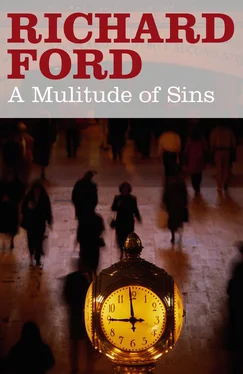Several people did eventually call about the puppy, having seen my signs, and I directed them all to the animal shelter. I went around a time or two and checked the signs, and several were still up along with the AIDS marathon flyers, which made me satisfied, but not very satisfied.
Each morning I sat in bed and thought about the puppy waiting for someone to come down the list of cages and see him there alone and staring, and take him away. For some reason, in my imaginings, no one ever chose him — not an autistic child, nor a lonely, discouraged older person, a recent widow, a young family with rough-housing kids. None of these. In all the ways I tried to imagine it, he stayed there.
Sallie did not bring the subject up again, although her sister called on Tuesday and said she knew someone named Hester in Andalusia who’d take the puppy, then the two of them quarreled so bitterly that I had to come on the phone and put it settled.
On some afternoons, as the provisional five waiting days ticked by, I would think about the puppy and feel utterly treacherous for having delivered him to the shelter. Then, other times, I’d feel that we’d given him a better chance than he’d have otherwise had, either on the street alone or with his previous owners. I certainly never thought of him as an ill force to be dispelled, or a threat to anything important. To me life’s not that fragile. He was, if anything, just a casualty of the limits we all place on our sympathy and our capacity for the ambiguous in life. Though Sallie might’ve been right — that the puppy had been a message left for us to ponder: something someone thought about us, something someone felt we needed to know. Who or what or in what way that might’ve been true, I can’t quite imagine. Though we are all, of course, implicated in the lives of others, whether we precisely know how or don’t.
On Thursday night, before the puppy’s final day in the shelter, I had another strange dream. Dreams always mean something obvious, and so I try as much as I can not to remember mine. But for some reason this time I did, and what I dreamed was again about my old departed law partner, Paul Thompson, and his nice wife, Judy, a pretty, buxom blond woman who’d studied opera and sung the coloratura parts in several municipal productions. In my dream Judy Thompson was haranguing Paul about some list of women’s names she’d found, women Paul had been involved with, even in love with. She was telling him he was an awful man who had broken her heart, and that she was leaving him (which did actually happen). And on her list — which I could suddenly, as though through a fog, see — was Sallie’s name. And when I saw it there, my heart started pounding, pounding, pounding, until I sat right up in bed in the dark and said out loud, “Did you know your name’s on that goddamned list?” Outside, on our street, I could hear someone playing a trumpet, a very slow and soulful version of “Nearer Walk with Thee.” And Sallie was there beside me, deep asleep. I of course knew she’d done it, deserved to be on the list, and that probably there was such a list, given the kind of reckless man Paul Thompson was. As I said, I had never spoken to Sallie about this subject and had, until then, believed I’d gone beyond the entire business. Though I have to suppose now I was wrong.
This dream stayed on my mind the next day, and the next night I had it again. And because the dream preoccupied my thinking, it wasn’t until Saturday after lunch, when I had sat down to take a nap in a chair in the living room, that I realized I’d forgotten about the puppy the day before, and that all during Friday many hours had passed, and by the end of them the puppy must’ve reached its destination, whatever it was to be. I was surprised to have neglected to think about it at the crucial moment, having thought of it so much before then. And I was sorry to have to realize that I had finally not cared as much about it as I’d thought.
Faith is not driving them, her mother, Esther is.
In the car, it’s the five of them. The family, on their way to Snow Mountain Highlands, to ski. Sandusky, Ohio, to northern Michigan. It’s Christmas, or nearly. No one wants to spend Christmas alone.
The five include Faith, who’s the motion-picture lawyer, arrived from California; her mother, Esther, who’s sixty-four and has, over the years, become much too fat. There’s Roger, Faith’s sister Daisy’s estranged husband, a guidance counselor at Sandusky JFK; and Roger’s two girls: Jane and Marjorie, ages eight and six. Daisy — the girls’ mom — is a presence, but not along. She’s in rehab in a large midwestern city that is not Chicago or Detroit.
Outside, beyond the long, treeless expanse of whitely frozen winterscape, Lake Michigan itself becomes suddenly visible, pale blue with a thin veneer of fog just above its metallic surface. The girls are chatting in the back seat. Roger is beside them reading Skier magazine.
Florida would’ve been a much nicer holiday alternative, Faith thinks. EPCOT for the girls. The Space Center. Satellite Beach. Fresh pompano. The ocean. She’s paying for everything and doesn’t even like to ski. But it’s been a hard year for everyone, and somebody has to take charge. If they’d gone to Florida, she’d have ended up broke.
Her basic character strength, Faith thinks, watching what seems to be a nuclear power plant coming up on the left, is the same feature that makes her a first-rate lawyer: an undeterrable willingness to see things as capable of being made better, and an addiction to thoroughness. If someone at the studio, a V.P. in marketing, for example, wishes to exit from a totally binding yet surprisingly uncomfortable obligation — say, a legal contract — then Faith’s your girl. Faith the doer. Faith the blond beauty with smarts. Your very own optimist. A client’s dream with great tits. Her own tits. Just give her a day on your problem.
Her sister Daisy is the perfect case in point. Daisy has been able to admit her serious methamphetamine problem, but only after her biker boyfriend, Vince, had been made a guest of the state of Ohio. And here Faith has had a role to play, beginning with phone calls to attorneys, a restraining order, then later the police and handcuffs for Vince. Daisy, strung out and thoroughly bruised, finally proved to be a credible witness, once convinced she would not be killed.
Going through Daisy’s apartment with their mother, in search of clothes Daisy could wear with dignity into rehab, Faith found dildos; six in all — one even under the kitchen sink. These she put in a plastic Grand Union bag and left in the neighbor’s street garbage just so her mother wouldn’t know. Her mother is up-to-date, but not necessarily interested in dildos. For Daisy’s going-in outfit, they eventually settled on a nice, dark jersey shift and some new white Adidas.
The downside of the character issue, the non-lawyer side, Faith understands, is the fact that she’s almost thirty-seven and nothing’s very solid in her life. She is very patient (with assholes), very good to help behind the scenes (with assholes). Her glass is always half full. Stand and ameliorate could be her motto. Anticipate change. The skills of the law, again, only partly in sync with the requirements of life.
A tall silver smokestack with blinking white lights on top and several gray megaphone-shaped cooling pots around it now passes on the left. Dense, chalky smoke drifts out of each pot. Lake Michigan, beyond, looks like a blue-white desert. It has snowed for three days, but has stopped now.
“What’s that big thing?” Jane or possibly Marjorie says, peering out the back-seat window. It is too warm in the cranberry-colored Suburban Faith rented at the Cleveland airport especially for the trip. The girls are both chewing watermelon-smelling gum. Everyone could get carsick.
Читать дальше












